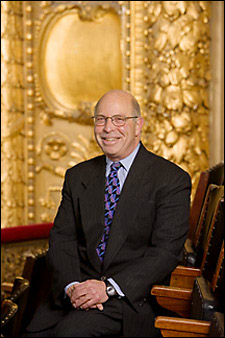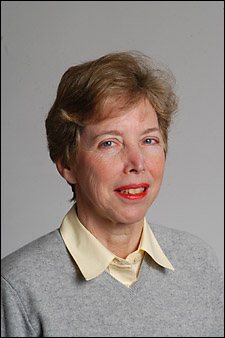Board of Overseers senior officers elected for 2006-07


Susan L. Graham ’64, the Pehong Chen Distinguished Professor of Electrical Engineering and Computer Science at the University of California, Berkeley, has been elected president of Harvard’s Board of Overseers for 2006-07. She will succeed Patti B. Saris ’73, J.D. ’76 following Commencement. Paul Buttenwieser ’60, M.D. ’64, a psychiatrist and novelist, will become vice chair of the board’s executive committee, succeeding M. Lee Pelton Ph.D. ’84. Both Graham and Buttenwieser are entering the final year of their six-year Overseer terms, having been elected to the board by Harvard alumni in 2001.
“Susan Graham and Paul Buttenwieser are two distinguished alumni leaders who have served Harvard with energy and devotion,” said Derek Bok, who will become interim president of the University on July 1. “I very much look forward to working closely with them, and with all the members of the Board of Overseers, in the time ahead.”
As an Overseer, Graham has chaired the board’s standing committee on natural and applied sciences and has served since 2004 on the board’s executive committee. An active participant in the process of visitation directed by the Board of Overseers, she has served as the first chair of the Committee to Visit the Radcliffe Institute for Advanced Study and has been a leading member of the Committee to Visit the Division of Engineering and Applied Sciences. She also serves on the board’s standing committees on the Schools, the College, and continuing education and on alumni affairs and development. She is one of the three Overseer members of the presidential search committee launched this spring.
After receiving her undergraduate degree in mathematics from Harvard-Radcliffe, Graham continued her studies at Stanford, receiving an M.S. (1966) and a Ph.D. (1971) in computer science. After two years at the Courant Institute for Mathematical Sciences, New York University, she joined the faculty of the University of California, Berkeley, where she was named the Pehong Chen Distinguished Professor in 2000.
Graham’s research spans many aspects of programming language implementation, software tools, software development environments, and high-performance computing. She has done seminal research in compiler code generation and optimization. Along with her students she has built several interactive programming environments, yielding a variety of incremental analysis algorithms. Her current research projects focus on Titanium (a Java-based parallel programming language, compiler, and runtime system) and Harmonia (a language-based framework for interactive software development).
Graham is a member of the National Academy of Engineering and a fellow of the Association for Computing Machinery (ACM), the American Association for the Advancement of Science, and the American Academy of Arts and Sciences. She was the founding editor in chief of ACM Transactions on Programming Languages and Systems, and in 2000 she received the ACM’s award for career achievement in programming languages. She has served on numerous advisory councils, including the U.S. President’s Information Technology Advisory Committee. From 1997 to 2005, she was the chief computer scientist for the National Partnership for Advanced Computational Infrastructure, sponsored by the National Science Foundation. She recently co-chaired a National Research Council study on the future of supercomputing.
Before serving on the Board of Overseers, Graham was an elected director of the Harvard Alumni Association.
Buttenwieser has served on the Overseers executive committee since 2005, while vice chair of the board’s committee on humanities and arts. He has in recent years been the Overseers’ liaison for Harvard’s ArtsFirst festival, and also serves on the board’s standing committees on institutional policy and on alumni affairs and development. A member of the Committee to Visit the Graduate School of Education, he has also been a member of visiting committees to an array of departments in the Faculty of Arts and Sciences – English, Government, Music, Psychology, and Visual and Environmental Studies.
A resident of Belmont, Mass., Buttenwieser is a child and adolescent psychiatrist at the Beth Israel Deaconess Medical Center and in private practice. He has taught courses on doctor-patient relationships and the experience of illness. He is also the author of two novels: “Free Association” (1981) and “Their Pride and Joy” (1987).
Active in the Boston arts community, Buttenwieser is a trustee of the Museum of Fine Arts and the Boston Symphony Orchestra, as well as chairman of the Institute of Contemporary Art. At Harvard, he has long served on the American Repertory Theatre’s advisory board, including seven years as its chair. He has also been a strong advocate for undergraduate public service, working closely with Phillips Brooks House. Along with his wife Katie, he founded the Family-to-Family Project, a nonprofit foundation formed to aid families who have lost their homes.
The Board of Overseers of Harvard College was created by the General Court of the Colony of Massachusetts Bay in 1642, six years after the founding of what is now Harvard University. The board is the larger of Harvard’s two governing boards, the other being the President and Fellows of Harvard College (also known as the Harvard Corporation). Members of the Board of Overseers are elected annually by holders of Harvard degrees. Typically, five new members are elected each year to six-year terms. The Overseers are responsible for visiting Harvard’s Schools and departments in order to assess the quality of their programs and recommend improvements, for consenting to certain acts of the Corporation, and for providing advice and counsel to the University on a wide range of issues important to Harvard’s future.




